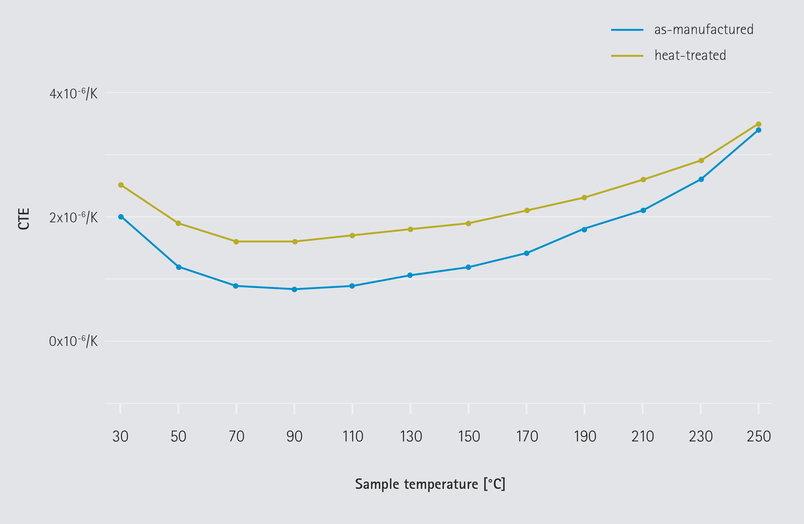
EOS FeNi36
Material Data Sheet
EOS FeNi36
Nickel-Iron alloy with low coefficient of thermal expansion
EOS FeNi36 is a nickel-iron alloy characterized by low coefficient of thermal expansion within the temperature range of 30 to 150 °C.
- Very low coefficient of thermal expansion (30-150 °C)
- Excellent dimensional stability under thermal cycling
- Housings and structures for optical and scientific instruments
- Aerospace and satellite structures
- Other applications requiring low thermal expansion
The EOS Quality Triangle
EOS incorporates these TRLs into the following two categories:
- Premium products (TRL 7-9): offer highly validated data, proven capability and reproducible part properties.
- Core products (TRL 3 and 5): enable early customer access to newest technology still under development and are therefore less mature with less data.
All of the data stated in this material data sheet is produced according to EOS Quality Management System and international standards
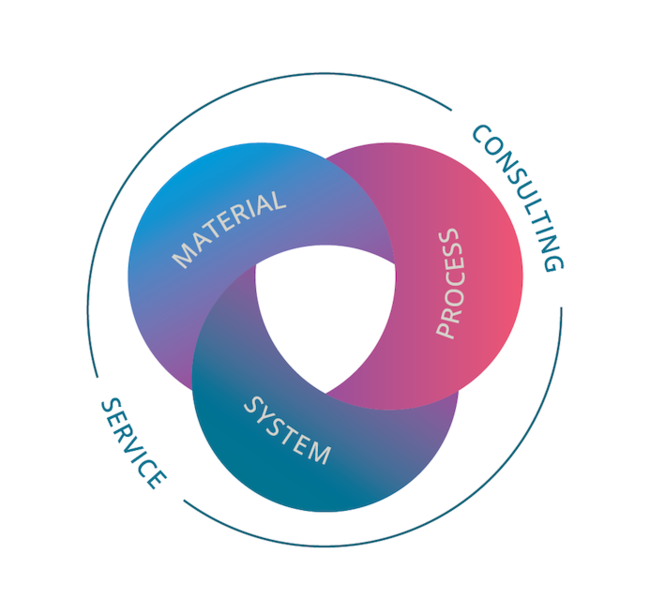
POWDER PROPERTIES
Material according to ASTM-F1684-06.
Powder Chemical Composition (wt.-%)
| Element | Min. | Max. |
|---|---|---|
| Fe | Balance | |
| Ni | 35.5 | 37.0 |
| Si | - | 0.4 |
| Mn | - | 0.6 |
| Cr | - | 0.25 |
| Co | - | 0.1 |
| C | - | 0.05 |
| Al | - | 0.1 |
| Mg | - | 0.1 |
| Zr | - | 0.1 |
| Ti | - | 0.1 |
| P | - | 0.015 |
| S | - | 0.015 |
Powder Particle Size
| GENERIC PARTICLE SIZE DISTRIBUTION | 15 - 53 μm | |
|---|---|---|
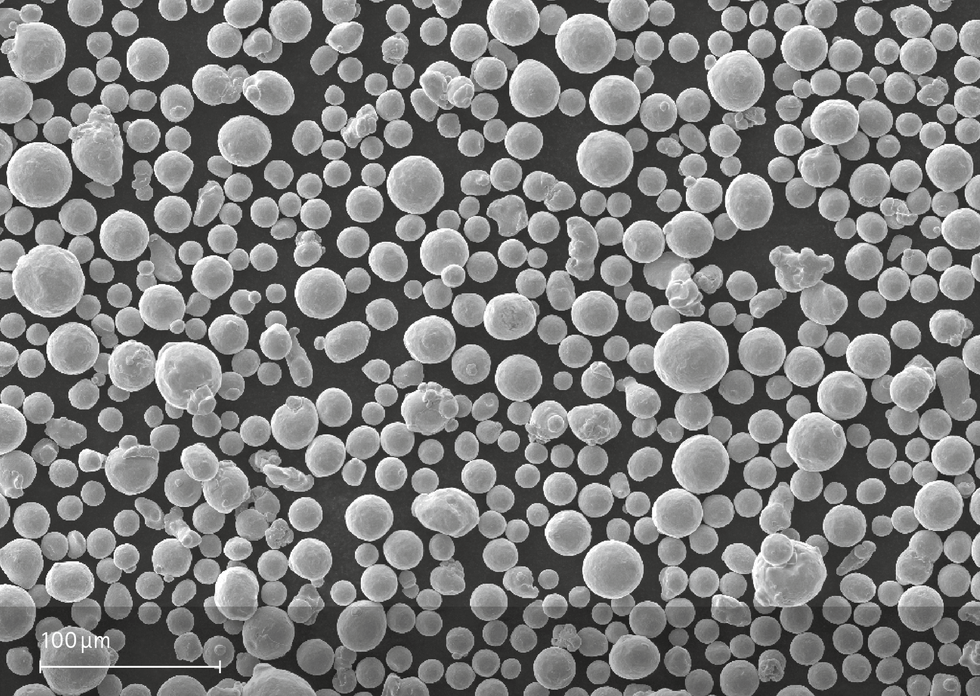
SEM image of EOS FeNi36 powder
HEAT TREATMENT
Anneal the part in a non-oxidizing atmosphere for a minimum of 1 h at 875 °C +/-25 °C when thoroughly heated.
Cool at a rate not exceeding 300°C/h.
EOS FeNi36 for EOS M 290 | 40 µm & 80 µm
EOS M 290 - 40 µm - TRL 3
Process Information Metal
This process product is optimized for flexible and fast production of EOS FeNi36 parts with the EOS M 290 system. The parameter set has two different layer thickness options that can all be utilized within the same build: 40 µm and 80 µm. The 40 µm parameter set is ideal for parts needing great detail resolution and more dense structure. The 80 µm parameter set offers a build rate that is more than double that of the 40 µm parameter set. The parameter sets are assigned to different sections in the same build job depending on the requirements.
| System Setup | EOS M 290 |
|---|---|
| EOS Material set | FeNi36_040_080_CoreM291 |
| Required Software Plan | EOS BUILD |
| Software Requirements |
EOSPRINT 2.13 or newer |
| Recoater Blade | Ceramic |
| Nozzle | EOS Grid Nozzle |
| Inert gas | Argon |
| Sieve | 75 µm |
| Additional Information | |
|---|---|
| Layer Thickness | 80 µm |
| Volume Rate | 3.7-7.9 mm³/s |
| Typical Dimensional Change after HT [%] | 0.0 % |
Chemical and Physical Properties of Parts
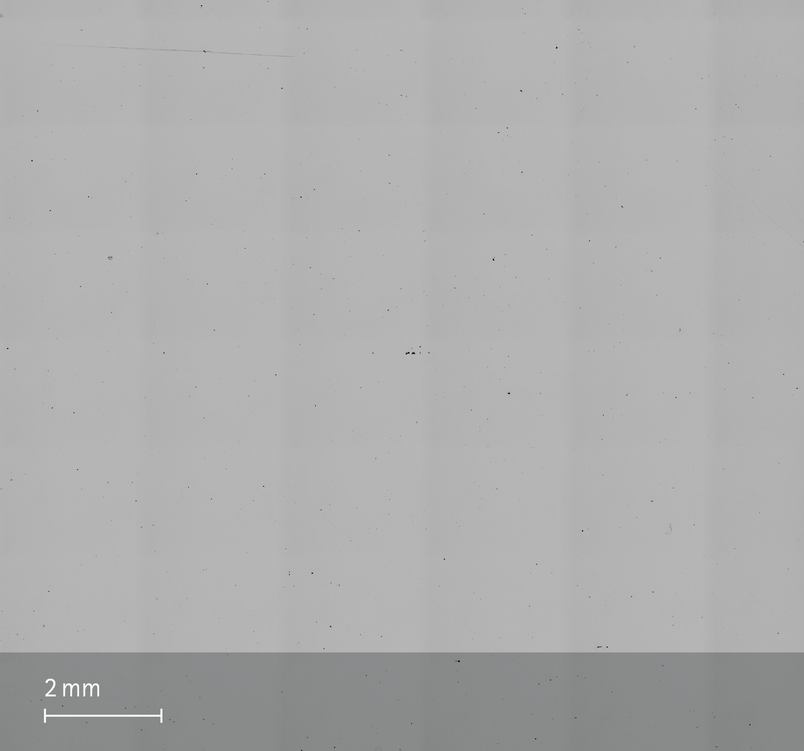
Microstructure of the Produced Parts
| Defects | Thickness | Result | Number of Samples |
|---|---|---|---|
| Average Defect Percentage | - | 0.05 % | - |
Mechanical Properties
Mechanical Properties As Manufactured
| EN ISO 6892-1 Room Temperature | Yield Strength [MPa] | Tensile Strength [MPa] | Elongation at Break A [%] | Reduction of Area Z [%] | Number of Samples | |
|---|---|---|---|---|---|---|
| Vertical | 340 | 420 | 40 | 78 | - | - |
| Horizontal | 380 | 460 | 35 | 80 | - | - |
Mechanical Properties Heat Treated
| EN ISO 6892-1 Room Temperature | Yield Strength [MPa] | Tensile Strength [MPa] | Elongation at Break A [%] | Reduction of Area Z [%] | Number of Samples | |
|---|---|---|---|---|---|---|
| Vertical | 310 | 420 | 42 | 78 | - | - |
| Horizontal | 320 | 460 | 36 | 78 | - | - |
Anneal the part in a non-oxidizing atmosphere for a minimum of 1 h at 875 °C +/-25 °C when thoroughly heated. Cool at a rate not exceeding 300°C/h.
Mechanical Properties Heat Treated
| Room Temperature | Yield Strength [MPa] | Tensile Strength [MPa] | Elongation at Break A [%] | Reduction of Area Z [%] | Number of Samples | |
|---|---|---|---|---|---|---|
| Vertical | 295 | 430 | 40 | 78 | - | - |
| Horizontal | 305 | 450 | 37 | 80 | - | - |
Anneal the part in a non-oxidizing atmosphere for a minimum of 1 h at 875 °C +/-25 °C when thoroughly heated. Cool at a rate not exceeding 300°C/h.
Hardness
| Value | 140 |
| Unit | HV |
Surface Roughness
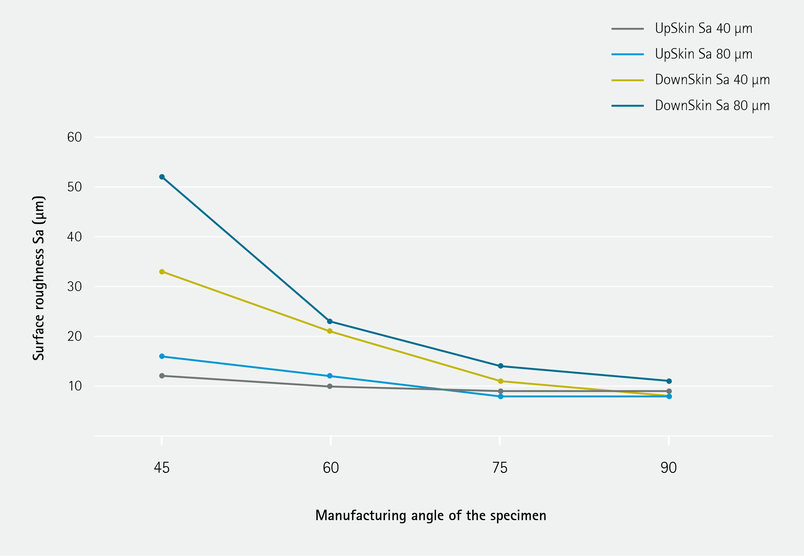
Coefficient of Thermal Expansion
